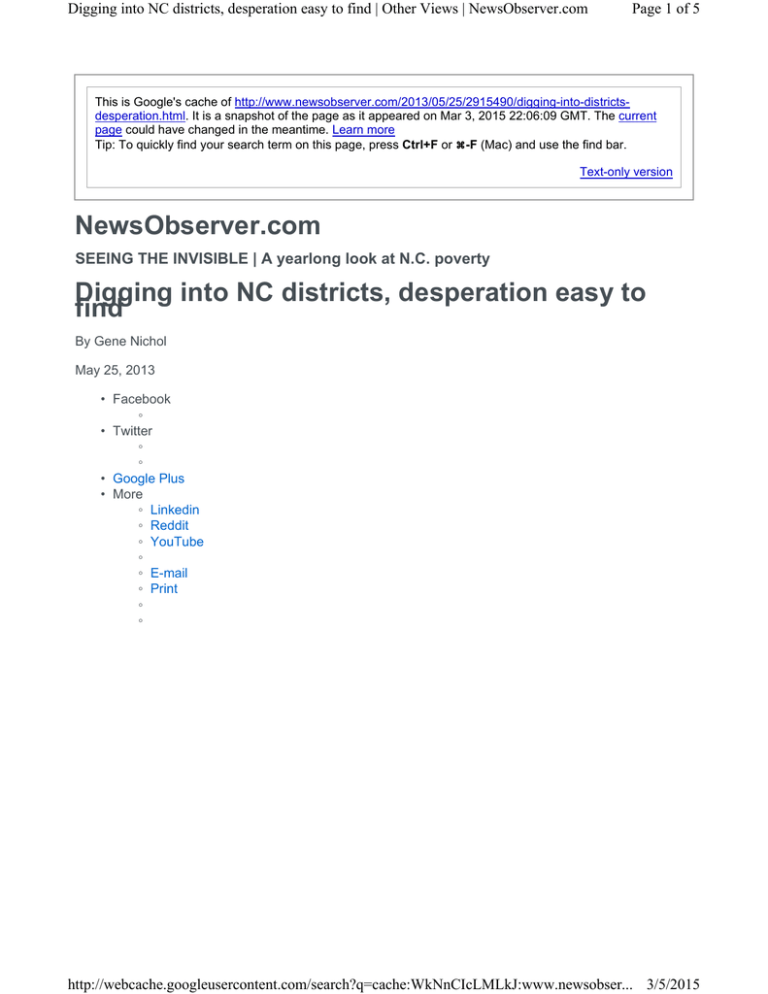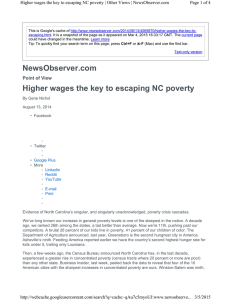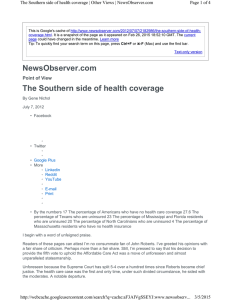
Digging into NC districts, desperation easy to find | Other Views | NewsObserver.com
Page 1 of 5
This is Google's cache of http://www.newsobserver.com/2013/05/25/2915490/digging-into-districtsdesperation.html. It is a snapshot of the page as it appeared on Mar 3, 2015 22:06:09 GMT. The current
page could have changed in the meantime. Learn more
Tip: To quickly find your search term on this page, press Ctrl+F or ⌘-F (Mac) and use the find bar.
Text-only version
NewsObserver.com
SEEING THE INVISIBLE | A yearlong look at N.C. poverty
Digging into NC districts, desperation easy to
find
By Gene Nichol
May 25, 2013
• Facebook
◦
• Twitter
◦
◦
• Google Plus
• More
◦ Linkedin
◦ Reddit
◦ YouTube
◦
◦ E-mail
◦ Print
◦
◦
http://webcache.googleusercontent.com/search?q=cache:WkNnCIcLMLkJ:www.newsobser... 3/5/2015
Digging into NC districts, desperation easy to find | Other Views | NewsObserver.com
Page 2 of 5
Megan Tilton, 30, sits outside her RV with her dog Hercules at Button's RV Park in Onslow County.
Tilton is unemployed, and pays $250 per month to rent the lot for her RV. She shares a refrigerator
with her neighbor, bathes in a community bathroom and currently cannot afford a tag for her car.
TRAVIS LONG — tlong@newsobserver.com Buy Photo
• THE SERIES
On the last Sunday of each month this year,
UNC Professor Gene Nichol will examine the faces and issues behind the rising poverty numbers
in North Carolina. Read the other installments at newsobserver.com/ncpoverty.
Last year, almost famously, Rep. George Cleveland of Onslow County stated in a committee hearing that
“there is no extreme poverty in North Carolina.” Cleveland challenged the U.S. Census Bureau’s findings
of intense and growing poverty in our state. Such conclusions, he asserted, are “just government agency
efforts to perpetuate what they want as a poverty level.” They keep redefining poverty to make sure we
have a poverty class. There’s no real deprivation in North Carolina. We might say governmentally that
people are poor, he concluded, but they’re not. I hope Cleveland is an outlier in claiming that the federal
extreme poverty standard, about $7 per person a day, is dramatically too generous. I doubt many
legislators believe we ought to be well-satisfied if our poverty levels don’t dramatically exceed those of
Haiti or Sierra Leone.
But Cleveland’s blustering led me to ponder a second question. Here, I fear, he might not be so singular:
Do these folks have any idea of the economic hardship occurring in their own districts?
About 185,000 people live in Onslow County. In Jacksonville, its largest city, over 30 percent of the work
force is active-duty military. So Onslow’s unemployment rate is not as pronounced as some Eastern North
Carolina counties. Its poverty rate is often a shade better than the state average.
http://webcache.googleusercontent.com/search?q=cache:WkNnCIcLMLkJ:www.newsobser... 3/5/2015
Digging into NC districts, desperation easy to find | Other Views | NewsObserver.com
Page 3 of 5
Still, 22 percent of kids (about 10,000) in Onslow County live in households with incomes under $23,000 a
year for a family of four. For black, Latino and Native American children, it’s about 4 in 10. Over 10
percent of Onslow County children live on less than half of that: $11,500 for a family of four.
In three Jacksonville elementary schools – Northwoods, Hunter’s Creek and Clyde Creek – about 70
percent of students qualify for the free and reduced-price lunch program. The Onslow County School
System reports that more than 350 of its school kids are homeless.
Likely as the result of (well-earned) military housing allowances, rents are quite high. The median monthly
rental is $858, compared with $744 for the rest of the state. Housing experts indicate that even
substandard mobile homes cost over $700 a month. Given the dominance of low-wage civilian jobs,
affordability is a potent problem. Of the 23,000 occupied rental units in the county, 9,000 dwellers pay
more than 35 percent of household income for rent alone.
Daphany Hill, director of Jacksonville’s Eastern North Carolina Human Services agency, reports that
others don’t fare even that well. “Last winter, we opened our waiting list” for federal housing assistance,
she said. This doesn’t get you housing help, of course. That may take years. But it gets you on the list.
“We had people camped out, in freezing weather, before midnight,” she said, with more than 300 lined up.
“They came with their blankets, their coffee, their tea” to make it through the night.
“We tried to get the elderly and disabled inside,” she said, “but there wasn’t enough room in the building.”
The agency took applications starting at 9 a.m., took them for over four hours and finally had to cut off the
line.
Pay the bills or get some gas?
One woman seeking the agency’s help (whose name I agreed not to use) was a single mother with two
teenage daughters. Hill knew her well. She’d taken advantage of an array of training programs. “She took
every referral. She’d happily dig ditches.” After getting a job and eventually being laid off, she exhausted
her unemployment benefits. Then one of her daughters got cancer.
She was faced with a choice between paying her bills and putting gas in the car to get to the doctor and
was selling her blood, she explained through tears, to help make ends meet.
Hill, holding back tears of her own, said maybe some legislators should go down there and meet some
people. It “makes me furious,” she said. “There’s plenty of poverty in Onslow County. You just have to be
willing to see it.”
Victoria Masters volunteers at the Second Chance Mission, where they prepare food parcels for families
who can’t get enough to eat. Given the exploding demand, they’ve had to designate a special phone line
just for food calls. Needing to ration, Masters checks folks in to ensure that no one from the household
has been to the mission in the last 30 days.
“I haven’t seen anyone drive up in a Jag yet,” she said, adding that nobody really wants to wait in line for
food they probably don’t want to eat in the first place.
“I see women go back to abusive men because they need the money,” she said with a sigh. “I know I did.”
They eventually decide homelessness is better.
Commander David Graves of the National Association for Black Veterans spearheads volunteer outreach
to the sizeable number of homeless veterans in Onslow County.
http://webcache.googleusercontent.com/search?q=cache:WkNnCIcLMLkJ:www.newsobser... 3/5/2015
Digging into NC districts, desperation easy to find | Other Views | NewsObserver.com
Page 4 of 5
“I’ve had seven homeless folks in my residence at a time,” he reported, noting that the only jobs available
are in fast food and won’t pay the rent. Last June, Jacksonville passed an ordinance, aimed at the
homeless, making it unlawful to camp or stay overnight on any city property without a permit.
He said people want to pretend homelessness doesn’t exist.
“My brother veterans served their country, and to tell them they don’t deserve a second chance bothers
me to no end,” Graves said, then he pointed to church buildings near the USO office. “Those rooms are
empty five out of seven days. Why don’t we house the poor?”
Commander Graves doesn’t mince words.
“If someone says there are no real poor people in North Carolina, he’s lying to himself, and everyone who
listens to him is stupid,” he said.
Maybe his verdict is too harsh. The federal poverty formula, developed in the 1960s, is antiquated –
based on food costs and failing to include various government benefits.
Still, a modernized formula, curing those deficiencies and developed by the National Academy of
Sciences at the request of Congress, would increase the numbers falling below the poverty threshold, not
reduce them. And international studies uniformly find the United States to be the richest, the poorest and
the most unequally advanced nation.
But if our leaders are adamant to reject the data, perhaps they could simply turn to the people of their
districts. Are hundreds of homeless Onslow school kids “poor”? Are veterans living in the woods of
Jacksonville “impoverished”? Are moms, desperate for work and selling blood to get their kids to a doctor,
an artificial “poverty class”? And aren’t they constituents as well?
Gene Nichol is Boyd Tinsley distinguished professor at the UNC School of Law and director of the
school’s Center on Poverty, Work and Opportunity.
• Facebook
◦
• Twitter
◦
◦
• Google Plus
• More
◦ Linkedin
◦ Reddit
◦ YouTube
◦
◦ E-mail
◦ Print
◦
◦
Join The Conversation
News & Observer is pleased to provide this opportunity to share information, experiences and
observations about what's in the news. Some of the comments may be reprinted elsewhere in the site or
in the newspaper. We encourage lively, open debate on the issues of the day, and ask that you refrain
from profanity, hate speech, personal comments and remarks that are off point. Thank you for taking the
time to offer your thoughts.
http://webcache.googleusercontent.com/search?q=cache:WkNnCIcLMLkJ:www.newsobser... 3/5/2015
Digging into NC districts, desperation easy to find | Other Views | NewsObserver.com
Page 5 of 5
Commenting FAQs | Terms of Service
Email Newsletters >
Manage newsletter subscriptions
Tablets >
Apps and services for tablet devices
Mobile >
Apps and services for your mobile phone
Social Media >
Get updates via Facebook and Twitter
e-Edition >
Your daily paper delivered to your computer
Home Delivery >
Manage your home delivery account
Digital Subscriptions >
Manage your online subscriptions
Raleigh Jobs
Raleigh Cars for sale
Raleigh Real Estate
Raleigh Deals
Raleigh Deals and Coupons
© 2015 www.newsobserver.com and wire service sources. All Rights Reserved. http://www.newsobserver.com
http://webcache.googleusercontent.com/search?q=cache:WkNnCIcLMLkJ:www.newsobser... 3/5/2015











